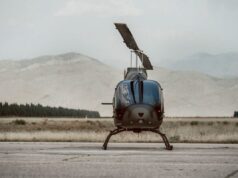The Foreign Office has announced a series of new measures that will be taken to prepare the British Overseas Territories in the Caribbean for the imminent hurricane season.
This review follows the devastating hurricanes which hit several of the territories late last year and required a significant military response. The new plans will see a Foreign Office led joint-unit to bring together humanitarian agencies, military support and diplomatic resources.
The new measures will see a significant role continue to be played by the armed forces; with several longstanding commitments reaffirmed and expanded.
RFA Mounts Bay, the Royal Navy’s permanent presence in the Caribbean since 2017, will remain in the region throughout the hurricane season this year and into 2019. She has recently completed a maintenance period in the United States, led by British shipyard A&P Group, to keep her operationally available throughout this period.
The vessel will continue her regular sequence of visits to each of the territories to build links with local disaster management personnel. Her embarked engineering resources will also be used to conduct professional analysis of selected critical infrastructure as part of an ongoing reconnaissance program. Under funding already committed the vessel has already been loaded with new humanitarian supplies including; 1000 collapsible jerry cans, 1000 hygiene kits and up to a thousand shelter systems.
Addressing the strengthened commitment, Minister for Armed Forces, Mark Lancaster said that “our Armed Forces are committed to supporting our Overseas Territories, and we have worked alongside our colleagues across Government to ensure we are fully prepared in the event of a natural disaster or other crisis. RFA Mounts Bay, which played a vital role during the 2017 hurricane crisis, remains ready in the Caribbean and will be supported by specialist forces from the UK if required.”
His views were echoed by the Minister for Overseas Territories Lord Ahmad who stated that the British Government had “been working hard with key partners across the region to ensure an even more effective and strategic response in the event we see a repeat of last year’s hurricane season.”
Plans are now in place for a multi-national coordination cell to maximise capability, improve immediate response times and avoid unnecessary duplication of effort across the Caribbean. So far meetings have already involved the United States, Netherlands, Canada and the Caribbean Disaster Emergency Management Agency (CDEMA), all working for the common aim of improved hurricane preparedness.










Here are the full details:
• Royal Fleet Auxilliary (RFA) Mounts Bay, a Navy ship deployed to the region since 2017, will remain in the vicinity of the Caribbean throughout the hurricane season this year and also for 2019
• Experts have been deployed to the region to lead negotiations on a number of commercial contracts, in advance of peak hurricane season, to deliver essential recovery needs
• Military reconnaissance and analysis in the Overseas Territories, building links and familiarity with local and regional disaster management personnel, and conducting professional analysis of selected critical infrastructure
• Plans for a multi-national coordination cell in the Caribbean to coordinate partner countries and organisations to make sure efforts aren’t being duplicated across the region and to make immediate responses more efficient. The UK has coordinated meetings between representatives from the USA, Canada and the Netherlands and the Caribbean Disaster Emergency Management Agency (CDEMA) to ensure a joined up approach to hurricane preparedness
• Emergency humanitarian supplies in the form of over 1000 collapsible jerry cans, 1000 hygiene kits and up to 1000 shelter kits have been pre-loaded onto RFA Mounts Bay, which will remain in the region for the hurricane season and be on hand to provide life-saving emergency assistance as required.
• DFID has also fielded a preparedness mission to the region from 5 to 17 June to coordinate UK preparations with both national and regional institutions
• DFID has well established programmes in the poorer Commonwealth countries of the Caribbean and, in addition to humanitarian assistance, is supporting reconstruction efforts in the hurricane-affected islands of Dominica and Antigua and Barbuda
• The UK has also helped ensure all islands affected by the hurricanes last year are now insured under the Caribbean Catastrophe Risk Insurance Fund (CCRIF). DFID helped establish the CCRIF which provided over $50 million of quick payouts to hurricane affected Caribbean countries and territories in 2017. This year, the UK has supported BVI and Montserrat to join as new members. This means that all of the islands affected last year are now covered.
https://www.gov.uk/government/news/new-hurricane-preparedness-plans-for-british-overseas-territories-in-caribbean
The costs to the RN and RFA should come out of the foreign aid budget, not defense.
I hope MOD is invoicing the Dept for International Development for every penny of the cost possible. The £14 billion aid budget can afford helping out the RN, after all the defence budget cuts have helped pay for the explosive growth in the wasted aid budget.
the chances of back to back years of bad storms is low but I’m surprised with all the positive news stories last year, that we are not sending more than 1 bay to the region, especially as ocean won’t be available to head there.